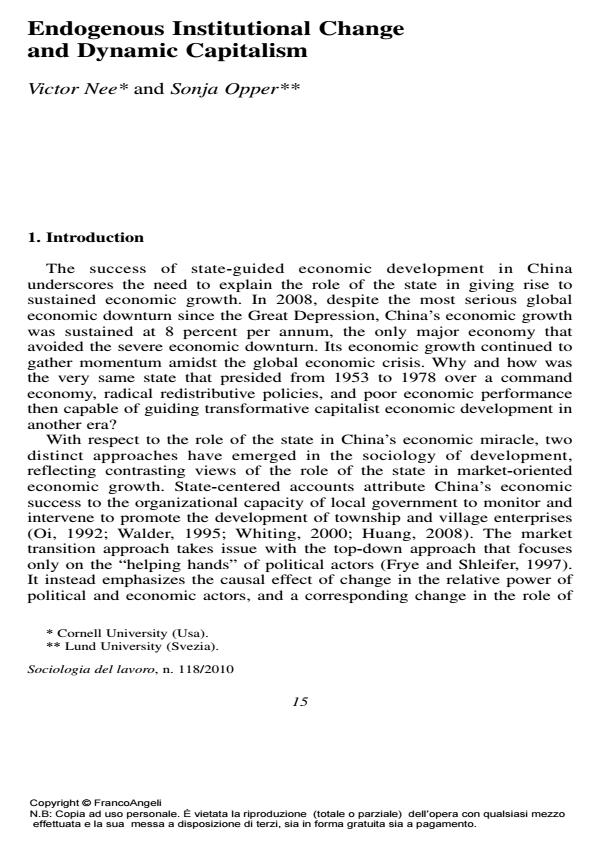Endogenous Institutional Change and Dynamic Capitalism
Journal title SOCIOLOGIA DEL LAVORO
Author/s Victor Nee, Sonja Opper
Publishing Year 2010 Issue 2010/118
Language English Pages 25 P. 15-39 File size 311 KB
DOI 10.3280/SL2010-118002
DOI is like a bar code for intellectual property: to have more infomation
click here
Below, you can see the article first page
If you want to buy this article in PDF format, you can do it, following the instructions to buy download credits

FrancoAngeli is member of Publishers International Linking Association, Inc (PILA), a not-for-profit association which run the CrossRef service enabling links to and from online scholarly content.
State-centered theory asserts that political institutions and credible commitment by political elite to formal rules securing property rights provides the necessary and sufficient conditions for economic growth to take place. In this approach, the evolution of institutions favorable to economic performance is a top-down process led by politicians who control the state. Hence, in less developed and poor countries, the counterfactual is that if formal institutions secure property rights and check predatory action by the political elite, then sustained economic growth would follow. The limitation of state-centered theory stems from the problem that behavioral prescriptions - formal rules and regulations - that reflect what politicians prefer can be ignored. In contrast, we lay out the bottomup construction of economic institutions that gave rise to capitalist economic development in China. Entrepreneurship in the economically developed regions of the coastal provinces was not fueled by exogenous institutional changes. When the first entrepreneurs decided to decouple from the traditional socialist production system, the government had neither initiated financial reforms inviting a broader societal participation, nor had it provided property rights protection or transparent rules specifying company registration and liabilities. Instead, it was the development and use of innovative informal arrangements within close-knit groups of like-minded actors that provided the necessary funding and reliable business norms. This allowed the first wave of entrepreneurs to survive outside of the state-owned manufacturing system. This bottom-up process resembles earlier accounts of the rise of capitalism in the West.
Keywords: State-centered theory, dynamic capitalism, China, exogenous vs. endogenous institutional change, formal institutions vs. informal arrangements
- Market design in Chinese market places Barbara Krug, Hans Hendrischke, in Asia Pacific Journal of Management /2012 pp.525
DOI: 10.1007/s10490-010-9225-5 - Getting the China Story Right: Insights from National Economic Censuses George C. S. Lin, Fox Z. Y. Hu, in Eurasian Geography and Economics /2011 pp.712
DOI: 10.2747/1539-7216.52.5.712
Victor Nee, Sonja Opper, Endogenous Institutional Change and Dynamic Capitalism in "SOCIOLOGIA DEL LAVORO " 118/2010, pp 15-39, DOI: 10.3280/SL2010-118002